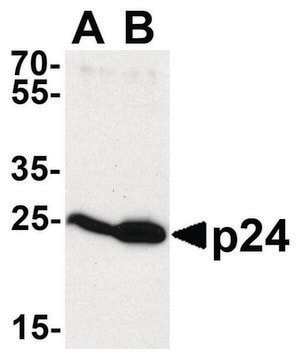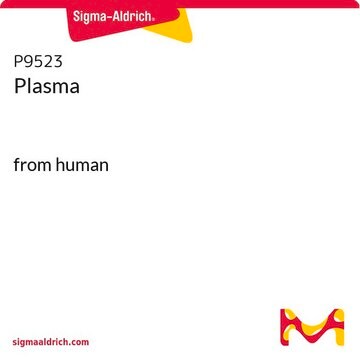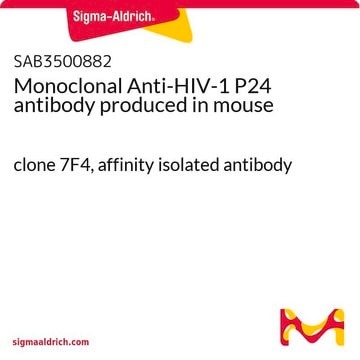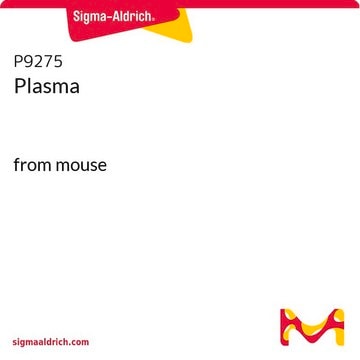H0160
HIV-1 gag
≥95% (SDS-PAGE), recombinant, expressed in E. coli, Galactosidase-tagged
Synonyme(s) :
p24 HIV antigen
Se connecterpour consulter vos tarifs contractuels et ceux de votre entreprise/organisme
About This Item
Produits recommandés
Produit recombinant
expressed in E. coli
Niveau de qualité
Pureté
≥95% (SDS-PAGE)
Poids mol.
39 kDa (plus 114 kDa β-Gal tag)
Concentration
1 mg/mL
Numéro d'accès UniProt
Température de stockage
−20°C
Informations sur le gène
human immunodeficiency virus 1 ... gag(155030)
Description générale
Contains amino acid residues [77-436] of HIV-1 gag antigen.
The human immunodeficiency virus 1 (HIV−1) gag antigen is a recombinant 39 kDa protein encoded by the GAG gene of the human immunodeficiency virus (HIV) type I expressed in and isolated from Escherichia coli. It has a β−galactosidase tag (114 kDa) on the N−terminus. HIV-1 Gag exists as monomers or lower-order oligomers in the cytosol. At the plasma membrane, it forms higher-order multimers.
Application
HIV-1 gag has been used in the coculture with an autologous cluster of differentiation T (CD4+ T) to study the ability of monocyte-derived dendritic cells (MDC1) to induce human immunodeficiency virus 1 (HIV−1) latency reversal (LR).
Actions biochimiques/physiologiques
The human immunodeficiency virus 1 (HIV−1) gag (p24) antigen reacts strongly with HIV positive serum and may be used as a positive control for evaluating antibodies to HIV. At transcription sites, HIV-1 Gag creates ribonucleoprotein complexes with unspliced viral RNA. The HIV-1 Gag protein is accountable for packaging genomic RNA (gRNA) and the assembly of immature viral particles.
Positive control for HIV antibodies.
Forme physique
Solution in 8 M urea, 20 mM Tris-HCl, pH 8.0, 10 mM 2-mercaptoethanol.
Code de la classe de stockage
10 - Combustible liquids
Classe de danger pour l'eau (WGK)
WGK 2
Point d'éclair (°F)
Not applicable
Point d'éclair (°C)
Not applicable
Certificats d'analyse (COA)
Recherchez un Certificats d'analyse (COA) en saisissant le numéro de lot du produit. Les numéros de lot figurent sur l'étiquette du produit après les mots "Lot" ou "Batch".
Déjà en possession de ce produit ?
Retrouvez la documentation relative aux produits que vous avez récemment achetés dans la Bibliothèque de documents.
C T Wang et al.
Journal of medical virology, 59(2), 180-188 (1999-08-25)
The incorporation of human immunodeficiency virus type 1 (HIV-1) Gag-beta-galactosidase (Gag-beta-gal; GBG) fusion proteins into HIV virus-like particles in the presence of HIV Gag proteins was studied. HIV Gag-beta-gal fusion constructs were cotransfected individually into COS7 cells with or without
Samantha Sarni et al.
The Journal of biological chemistry, 295(42), 14391-14401 (2020-08-21)
The HIV-1 Gag protein is responsible for genomic RNA (gRNA) packaging and immature viral particle assembly. Although the presence of gRNA in virions is required for viral infectivity, in its absence, Gag can assemble around cellular RNAs and form particles
Xiaoling Zhang et al.
Cancer biology & medicine, 17(2), 418-432 (2020-06-27)
Objective: Bevacizumab is a recombinant humanized monoclonal antibody that blocks vascular endothelial growth factor (VEGF) with clear clinical benefits. However, overall survival of some cancer types remains low owing to resistance to bevacizumab therapy. While resistance is commonly ascribed to
Kevin M Tuffy et al.
Viruses, 12(11) (2020-11-14)
The ability of the retroviral Gag protein of Rous sarcoma virus (RSV) to transiently traffic through the nucleus is well-established and has been implicated in genomic RNA (gRNA) packaging Although other retroviral Gag proteins (human immunodeficiency virus type 1, HIV-1;
Jan Kristoff et al.
EBioMedicine, 43, 295-306 (2019-04-07)
Despite the success of antiretroviral therapy (ART), latent HIV-1 continues to persist in a long-lived population of resting memory CD4+ T cells within those who are infected. Finding a safe and effective means to induce latency reversal (LR) during ART
Notre équipe de scientifiques dispose d'une expérience dans tous les secteurs de la recherche, notamment en sciences de la vie, science des matériaux, synthèse chimique, chromatographie, analyse et dans de nombreux autres domaines..
Contacter notre Service technique








